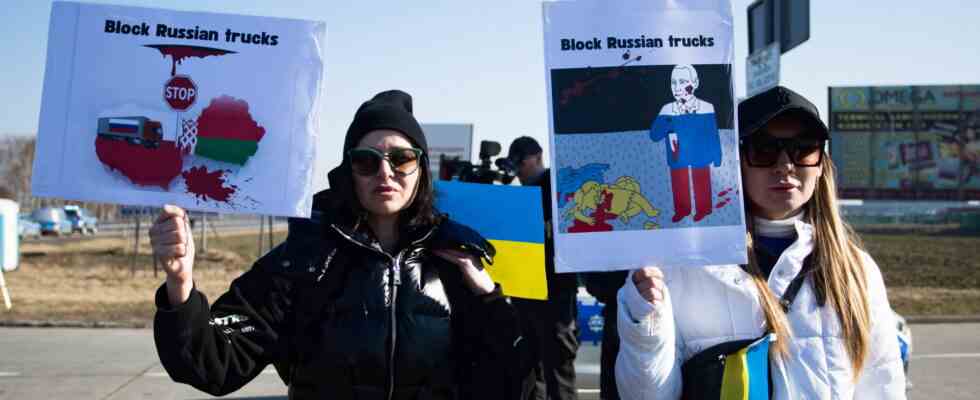Status: 03/25/2022 03:45 a.m
Pressure is growing on Poland to close the road border crossings to Belarus and thus to Russia. But with a total trade embargo, the country and its neighbors themselves would have much to lose.
Ukrainian and Polish activists blocked traffic at the Kukuryki border crossing last weekend. She is outraged that despite the Russian war against Ukraine, trucks continue to be dispatched to Belarus.
“We see here a more than 20-kilometer long line of trucks from EU countries that drive easily to Belarus and from there to Russia. Some truck drivers even admitted that they deliver steel,” says Natalia Panczenko from the Polish branch of the Ukrainian Euromaidan movement.
Another driver spoke to her about ‘aid deliveries’ for children in Minsk. “But there is no border between Belarus and Russia, and what goes to Minsk will be in Moscow tomorrow and will be used to treat Russian injuries,” Panczenko is sure. She sees it as a scandal that despite the sanctions against both countries, equipment can continue to be supplied to Belarus and Russia.
Warsaw: Total blockade brings little
Warsaw rejects this: It will be closely monitored. However, reporters from media critical of the government reported that only sporadic checks were actually carried out due to the high volume of traffic. Government spokesman Piotr Müller explained that his country could only completely block trade in consultation with Brussels: “Today we can make transports so difficult by checking them in great detail. Nothing that could be dangerous is allowed into Belarus,” he assures.
A unilateral total blockade would be of little use because the transports would then be diverted via the Baltic States. The Baltic states, especially Lithuania and Latvia, have a lot to lose: their foreign trade with Russia and Belarus accounts for about a tenth of the total volume.
Morawiecki plans to “derussify” the economy
But it’s also about billions for Poland: After a dip in 2015 as a result of the first sanctions against Russia, Polish exports there rose again dynamically to a total value of around eight billion euros a year. A dilemma for the Polish government, which likes to present itself as a pioneer in enforcing strict sanctions.
Prime Minister Mateusz Morawiecki just announced an “anti-Putin shield”: “We will deal with the derussification of the Polish and European economy, because today Poland is the outpost of countries that are trying to inspire others to break their dependency on gas to solve oil and Russian coal,” he said.
Trade embargo against Belarus once discarded
The “Baltic Pipe” project, which will pump Norwegian gas to Poland via Denmark and is scheduled to go into operation before the end of this year, is of correspondingly great strategic importance; the commissioning of a liquid gas terminal in Swinoujscie is now proving to be far-sighted.
It’s more difficult with other product groups: Economic experts in Warsaw say that among the multi-billion dollar imports from Russia and Belarus – including aluminum, chemical products and wood – there are also some that are needed by Polish producers and cannot easily be replaced. This includes certain metal and rubber products.
A trade embargo had already been discussed in the fight against the refugee crisis triggered by the Minsk ruler Alexander Lukashenko – and was rejected: it was said at the time that it was too expensive for the Polish economy.

